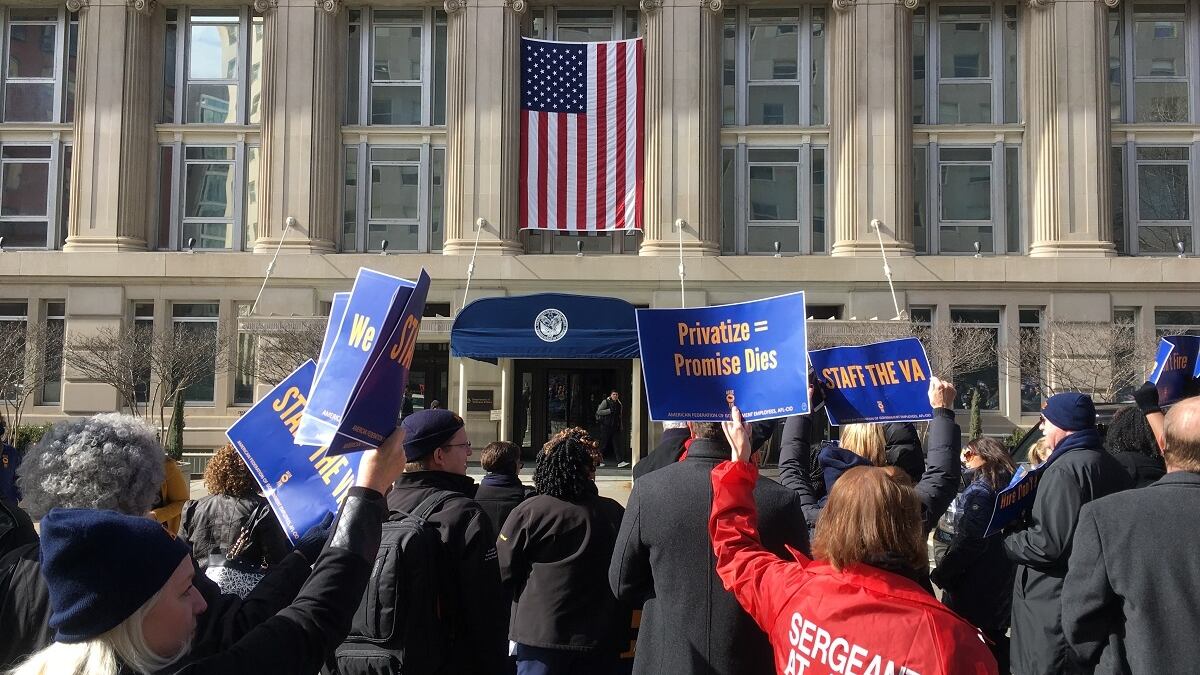The U.S. Department of Veterans Affairs acted unfairly in brokering a new contract with a labor union representing some 291,000 agency employees, an arbitrator ruled.
Felice Busto wrote in a March 9 decision that in the course of negotiating over the federal government’s largest collective bargaining agreement last year, the VA violated the Federal Service Labor-Management Relations Statute.
The union has alleged that the agency was merely going through the motions in the talks, “asserting that it had ‘no interest’ or ‘disagreed’ with [the union] without offering counter proposals.”
“The arbitrator directs the agency to cease and desist from bargaining in bad faith during collective bargaining negotiations with the American Federation of Government Employees,” Busto wrote.
The decision requires the agency to rescind some of its proposals and post a notice of the ruling to employees for 60 days. The agency did not immediately respond to requests for comment on Busto’s ruling.
AFGE’s National VA Council, which represents VA workers, says it has been negotiating with agency officials on a new labor contract for a year, with unresolved differences on significant issues still in the way.
“This arbitration decision is proof that our previous criticisms of the VA negotiating team were valid and that Secretary [Denis] McDonough’s VA is acting in a way totally contrary to President Biden’s commitment to be the most pro-union president in history,” said Alma Lee, NVAC’s chief negotiator in a statement on March 13.
In 2022, after the presidential transition brought in new labor policies, negotiations started up again on an updated collective bargaining agreement on a range of issues including employee discipline, awards and promotion.
This week, the parties are still in talks, with tentative agreements in place on much of the language that is rolling over from the previous contract or that has been deemed beneficial to both sides. However, union officials said they’ve reached impasses on substantive portions of nearly each of the 11 articles on the table.
“The tentative agreements are subject to an agreement in the whole,” said Bill Wetmore, NVAC executive vice president, in an interview on March 7. “That’s why they’re tentative. So if we reach agreement in the whole, then all those tentative agreements will become finalized.”
RELATED

Sticking points continue to be details on employee discipline, awards and promotion.
“They don’t want us involved in upward mobility,” Wetmore said in the interview. “They don’t want us involved in merit promotion. Their proposals cut us out of all those activities ... To cut us out of these kinds of considerations seems short sighted.”
Union representatives said intransigence on the agency’s behalf seems to stem from lingering attitudes that align more closely with the Trump administration’s stances on management authority than with what the Biden administration has urged about protecting the merit-based civil service.
Following Joe Biden’s inauguration, the White House and Congress moved to stamp out and reverse measures by Donald Trump that collectively impeded unions’ employee representation at the worksite and attempted to bypass the merit-system via a reclassification to Schedule F.
“A unionized VA workforce is a strong VA workforce,” said VA Secretary Denis McDonough at a March 2 press conference. “We achieve great things through collective bargaining ... Good faith bargaining with the American Federation of Government Employees on a new master agreement is progressing and tentative agreements on language are reached at every bargaining session. I attach great importance to these talks and have remained closely and personally engaged in them.”
Wetmore said there’s a disconnect between what the department’s leaderships says and what transpires at the bargaining table and in litigation.
VA Press Secretary Terrence Hayes said in a statement to Federal Times on March 15 that in the past two years, the department has taken several steps to support employees’ interests at the workplace, including reestablishing the National Partnership Council, restoring official time for union representatives and resuming labor management meetings with VA union officials.
Still, the union says it struggles to find a legal basis for some of the VA’s arguments.
“I would think, for a friendlier administration, we wouldn’t still be here,” said Linda Ward-Smith, president of AFGE Local 1224, in an interview. “It appears that we’re still under Trump guidance as far as management leadership and instructions and directions given to them. It just doesn’t feel different.”
Nearly 80% of all VA public servants are bargaining union employees, according to the department.
“The way it’s going, I think we’re scheduled to do this for at least another year, and then we’ll be in mediation” said Wetmore.
Mediation may help narrow down the differences, Wetmore said, but if that doesn’t result in a voluntary agreement, then the Federal Service Impasses Panel would be the next step.
So far, in addition to awards, merit promotion and discipline, the parties have discussed investigations, performance appraisal, local supplemental agreements, term negotiation, official time and technology procedures for administering and tracking. The health and safety article was dropped from negotiations, and telework is not among topics being negotiated.
Molly Weisner is a staff reporter for Federal Times where she covers labor, policy and contracting pertaining to the government workforce. She made previous stops at USA Today and McClatchy as a digital producer, and worked at The New York Times as a copy editor. Molly majored in journalism at the University of North Carolina at Chapel Hill.





